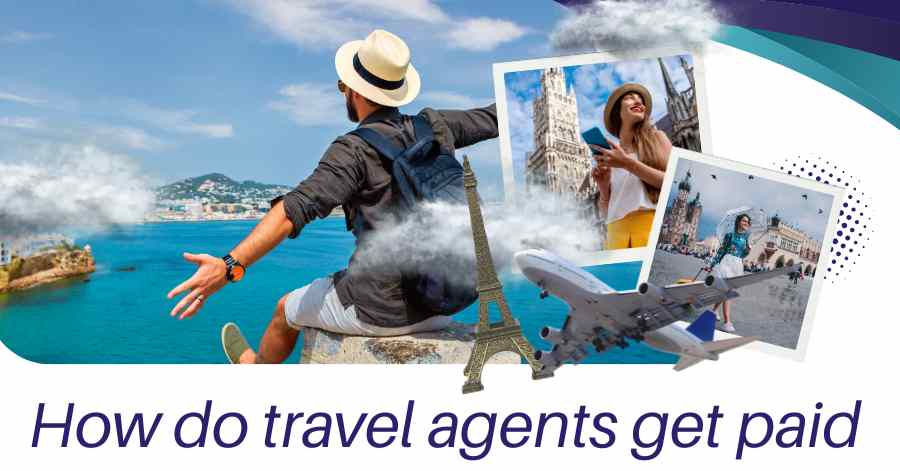The travel agent plays a vital role in the industry. These agents help their clients to plan vacations and navigate complicated travel arrangements. They also provide advice. How do they get paid?
Most travel agents earn their income primarily through commissions. Travel suppliers such as hotels, airlines and tour operators are usually responsible for paying these commissions. This commission is calculated as a percent of the cost of travel that was booked by the agent.
The commission structures can be very different. The commission structure can vary depending on the booking type, supplier relationship, agent experience, etc. Agents may charge extra fees to provide their service.
This article will explore the world of commissions for travel agents. In this article, we’ll examine how travel agents are paid, the different ways they earn income and ethical issues surrounding commission disclosure. Also, we’ll look at the way the travel industry has evolved and the possible future of commissions for agents.
This comprehensive guide is a great resource for anyone interested in the financial aspects of planning a trip, whether you are an aspiring agent or professional traveler. Let’s take this trip to learn about the complexities of travel agent fees.
Understand Travel Agent Commissions
The financial landscape of the travel industry is dominated by commissions paid to agents. Most travel agents earn their money from commissions. The commissions paid to travel agents are calculated as a percent of the total booking cost. This includes all suppliers, including airlines, hotels and cruise ships. This percentage can vary depending on several factors.
Typically, commission rates range between 10 and 15 percent. Bookings at the top end, such as luxury holidays, can yield higher returns. Sometimes, agents receive up to 18% commission, particularly for complex and expensive trips.
In most cases, the commission is included in the cost of the service. Clients don’t have to pay any extra. The travel agency pays a percentage of the total cost as commission.
Other agents might charge extra fees. They can include a service fee or flat rate on top of the commission. They compensate the time spent on complicated trips.
Bonuses are also available to travel agents. Suppliers offer incentives to agents that meet sales goals. Anyone considering a career is wise to understand these subtleties.
Travel Agent Commission: The basics
Travel agent commissions are simple at their core. The commission is a cut of the booking price. Travel agents receive this payment from suppliers as a reward for helping them sell their products.
It is a major incentive. The commission structure encourages travel agents to market a specific supplier. Both the suppliers and travel agents benefit from this symbiotic partnership.
Typically, the payment of commissions is finalized after the travel has been completed by the customer. Agents ensure that the whole journey is smooth before they receive their commission.
What is the Commission rate?
The rates of commission are not arbitrary, but rather influenced by a variety of factors. Relationships between agent and supplier are the main factor. A strong relationship could lead to better terms of commission.
The type of service that is booked also plays an important role. Bookings that are complex, such as cruises, may result in higher commissions. Commission rates can also be affected by market demand, competition between suppliers and the overall level of service.
The volume and performance of sales can influence the percentage of commissions. A high-performing agent may be able to negotiate a higher rate. These suppliers reward these agents to keep them motivated and loyal.
There are different types of commission structures
Although commissions are a common practice, their structure is flexible. Agents can operate on a commission-based system. Some agents incorporate multiple revenue streams in their business models.
Commissions can be increased for certain bookings such as luxury high-end tours. These experiences are more complex and expensive, so suppliers will offer higher commissions. They may offer higher payouts.
Another variation in commission structures is group bookings. Agents may receive a larger commission when planning big events like destination weddings. This is because the scale of these bookings warrants a higher commission.
Finaly, the host agency is often a factor in the commission structure. A host agency may share some of the commission with independent agents. The relationship is still beneficial to the agents, as it offers more resources and support. This could lead to higher earnings.
What do travel agents get paid?
Travel agents’ earnings can be very variable. The type of bookings and clientele they handle will influence their earnings. In general, commissions are the main source of revenue. The exact figure depends on a number of factors.
This is a breakdown on what affects their income.
- Booking Type Luxury Travel often results in higher commissions.
- Contracts with Supplier Some suppliers provide better prices for agents who are preferred.
- Increase in Sales: More sales can result in increased profits.
- Geographic Location Regions that have a higher demand for travel may offer higher earnings potential.
Agents with loyal clients tend to earn more. The agents have a better bargaining power when it comes to commission rates. They may also receive repeat customers, adding to their income.
New agents may start out with a lower salary. First, they must establish relationships with their suppliers and demonstrate that they are capable of selling. As they build up experience and reputation over time, their earning power increases.
Standard Commission Rates for the Industry
The standard commission rate for travel agents serves as a benchmark. Generally, they range between 10 and 15 percent. The range is heavily dependent on the travel arrangements.
Hotel bookings, for example, might be rewarded with a commission of 10%. Tours and package offers could be charged 15% or even more. Agents are encouraged to use these percentages as an incentive for promoting specific suppliers.
Some agencies also work on net rates. Agents can customize the commission by adding markups. These options can allow agents to adjust pricing strategies and maximize their earnings.
Specialty Bookings Commissions
Unique commissions are available for certain travel niches. One example is specialty bookings such as travel for luxury. The commissions on these bookings are often higher because they have higher prices.
Cruising is another profitable area. Cruise commissions are often up to 18% due to the complexity of these ships and their higher base rate. Specialization in this area can result in higher earnings for agents.
Corporate travel and bookings for groups can also increase your income. It is often necessary to have additional expertise when handling itineraries. Group rates are often accompanied by increased commissions.
Commissions and Volume: The Effects of Performance and Volume
The success of an agent can have a dramatic impact on their income. High sales volume agents often receive higher commissions. Agents who deliver consistent results are valued by suppliers and they may even offer incentives.
It is not unusual to see performance-based incentives. They can be in the form of higher commission rates or bonuses. These bonuses can also be offered by suppliers to agents who achieve specific sales goals.
A representative’s track record also plays an important role. Agents with high-performance records can get better deals. These agents tend to have strong relationships with suppliers, which increases their earnings.
Other Revenue Sources for Travel Agents
Although commissions make up a large part of the income of a travel agent, they do not constitute their sole source. Diversifying their income streams is a way for many agents to maintain their financial stability. It can provide a more stable income stream and a buffer to fluctuations in the booking season.
A common method is to charge service fees. They ensure that agents are compensated even if commissions received from suppliers do not meet expectations. This can cover time spent customizing complicated itineraries.
Another option is to charge flat rates for specific services. A set price may be charged by agents for consultations or planning trips. It helps to define expectations between agents and their clients.
Agents also benefit from incentives and bonuses. These are often provided by travel suppliers to their top agents. These bonuses can boost an agent’s income significantly and promote high sales.
Services Fees and Flat Rates
Travel agents are increasingly charging service fees. These fees are charged by agents to compensate for the time and expertise involved in planning trips. These fees ensure agents receive fair compensation for their work, regardless of fluctuations in commission.
Simple and transparent, flat rates are a great way to simplify your budget. You can apply them to services such as itinerary planning and travel consultation. The simple approach allows agents to manage clients’ expectations while ensuring that they are compensated.
Rewards and Bonuses
Travel agents can benefit from incentive programs. Many suppliers offer incentives for reaching certain sales goals. The bonuses are a great way to reward agents for their success.
Other incentives include higher commissions percentages and exclusive deals. These perks boost the income of agents and also improve their ability to provide superior customer service.
What are the specific travel agents’ salaries?
Different travel agent roles involve distinct payment structures. Here’s how Disney, AAA and cruise agents make money. They all have their own unique ways of earning, which are influenced by industry standards and conditions.
They have access to exclusive opportunities. Disney’s vast network and promotional activities are of benefit to them. The exclusivity of Disney’s networks and promotions can have a significant impact on their commission structure.
AAA Travel Agents often use a hybrid model of pay. Most AAA travel agents receive both a salary and commissions. This method combines the security of a stable income with the potential for a boost in sales.
The high commissions on cruises is well-known. It is this high commission rate that attracts cruise agents. The agents offer travel packages that are unique and they earn from the suppliers accordingly.
What do Disney Travel Agents get paid?
Disney travel agents make their money primarily from commissions. Disney has a range of packages that are exclusive and often include commissions. The commissions can range between 10% and 16% depending on package, agency relationship.
Disney Travel Agents do not usually charge additional fees to their customers. Disney’s commission system is sufficient. Disney offers a robust commission structure that allows these agents to focus their efforts on creating magical experiences.
What do AAA travel agents get paid?
AAA Travel Agents enjoy a diverse pay structure. They often earn a salary base, which is supplemented with commissions. The combination of commissions and base salary provides a stable income that rewards agents for their performance.
AAA agent commissions are based on booking volumes and deals with suppliers. The agents may also be awarded performance bonuses. It increases their earning capacity while providing AAA-recognized services.
What do travel agents get paid for cruises?
Agents can earn a lot of money by booking cruises. Cruises offer up to 18% commissions. The cruise industry offers a commission of up to 18%, which is more than most other sectors.
When selling cruises, agents often mix in add-ons and packages. They can also sell travel insurance and excursions, increasing their income. Agents can maximize their cruise revenue by offering a variety of products and services.
Transparency in travel agent commissions and ethics
In the travel industry, transparency is essential. The travel agent must clearly explain how they make their money. It builds trust with clients and helps them understand what they are getting.
Ethics in the disclosure of commissions is crucial. The agents must tell their clients about any commissions and fees upfront. Honesty helps to maintain client relationships over time and improves the business’ credibility.
Constant awareness is required as the ethical environment changes constantly. It is important for travel agents to stay up-to-date on industry standards. They build trust and a strong reputation by maintaining integrity.
Disclosure of Commissions and Fees
It is important to communicate clearly about fees and commissions. The clients deserve to be informed about the impact of their payment on an agent’s earnings. The disclosure of this information establishes confidence and prevents confusion later.
Customers are more satisfied with agents who are transparent. They distinguish themselves from the competition by being transparent. Understanding the fees structure will encourage clients to continue using services.
It is a symbiotic relationship between agents and suppliers
The relationship between travel agents and suppliers is mutually beneficial. Agents help suppliers reach a wider audience and increase sales. Agents rely on their suppliers to provide them with quality service and competitive commissions.
Both parties are encouraged to maintain their relationship. Clients benefit from exclusive deals when they have strong relationships. The travelers benefit from a well-maintained relationship, which enhances their experience.
Travel Agent Commissions: The Future
Travel agent commissions are changing. The changing nature of consumer behavior and technological advancements are altering the way agents make their living. To thrive in such a dynamic environment, it is important to remain adaptable.
Travel services are becoming increasingly personalized. Agents who provide unique and tailored services are likely to stand out as clients continue to demand custom experiences. Agents who are innovative and can provide exceptional value will benefit from this trend.
It is possible that the commission structure itself will change. Agents may need to change their strategy as more online travel bookings are made. Service quality and customer relationships are likely to become increasingly important.
How to adapt to industry changes and technology
It is important to keep up with the changes in your industry. Booking processes are constantly being transformed by digital tools and platforms. To optimize operations, agents must adopt these technologies.
A competitive advantage is gained by harnessing technology. The ability to adapt quickly and efficiently to new technologies can help improve service for customers, as well as expand offerings. The travel industry’s growth is largely driven by innovation.
Professional Development and Networking: What is their role?
In the travel business, it is important to maintain a high level of professional competence. Travel agents who take on training and certifications will be able to leverage their enhanced skills in order to earn higher commissions. The commitment to excellence also enhances the ability of agents to provide premium services.
The importance of networking in career development cannot be overstated. Connections with peers in the industry and suppliers may lead to new possibilities. This will not only improve your knowledge, but can also result in better deals and commissions.
Summary: Travel agents are valuable.
The value of travel agents is immense. They can transform a trip into an extraordinary experience with their expertise and contacts. Agents can save clients time and money.
Travel agents offer a personal service that cannot be undervalued. Travel agents provide peace of mind and tailored solutions throughout your journey. Their role is crucial as industry dynamics change. They deliver seamless, unforgettable experiences. They are vital to the travel industry because of their relationships and trust they develop with both clients and suppliers.
Questions and Answers on Travel Agent Commissions
1. Travel agents are paid primarily through the commissions they receive from suppliers of travel services such as hotels, airlines and cruise ships. The travel agent may charge a service fee for his or her expertise.
2. The typical travel agent commission rate is between 10% to 15%. For luxury or complex trips, however, commissions may reach as high as 18%.
3. Travel agents may charge fees to clients for services. While many earn enough commission from suppliers that they do not need to charge additional fees, others charge service fees in order for them cover the time spent on complex itinerary planning.
FAQs
1. Travel agents are paid?
Primarily through the commissions they receive from suppliers of travel services such as hotels, airlines and cruise ships. The travel agent may charge a service fee for his or her expertise.
2. How much commission do travel agents typically charge?
For most bookings, travel agents typically charge between 10% to 15% commission. For luxury or complex travel, however, commissions may reach as high as 18%.
3. Travel agents are charged fees by clients for services rendered?
Some travel agents may charge service fees in order to compensate for their expertise and time, particularly when it comes to complex itinerary.
4. What are some ways a travel agent can increase his or her earnings?
Travel agents who are new to the industry can boost their income by developing strong relationships with suppliers and niche markets. They should also focus on excellent customer service in order to increase repeat business.
5. Travel agent commissions are paid after the travel?
It ensures agents only receive commissions after the client’s trip has been completed.
6. What are the differences in commissions between different types of agents?
Different types of agents have different commissions based on industry connections and services provided.
7. Do travel agents have additional earning opportunities?
Yes, they can increase their income through a variety of additional sources, including bonuses, planning fees, consultations, or commissions from special bookings, like corporate travel.


